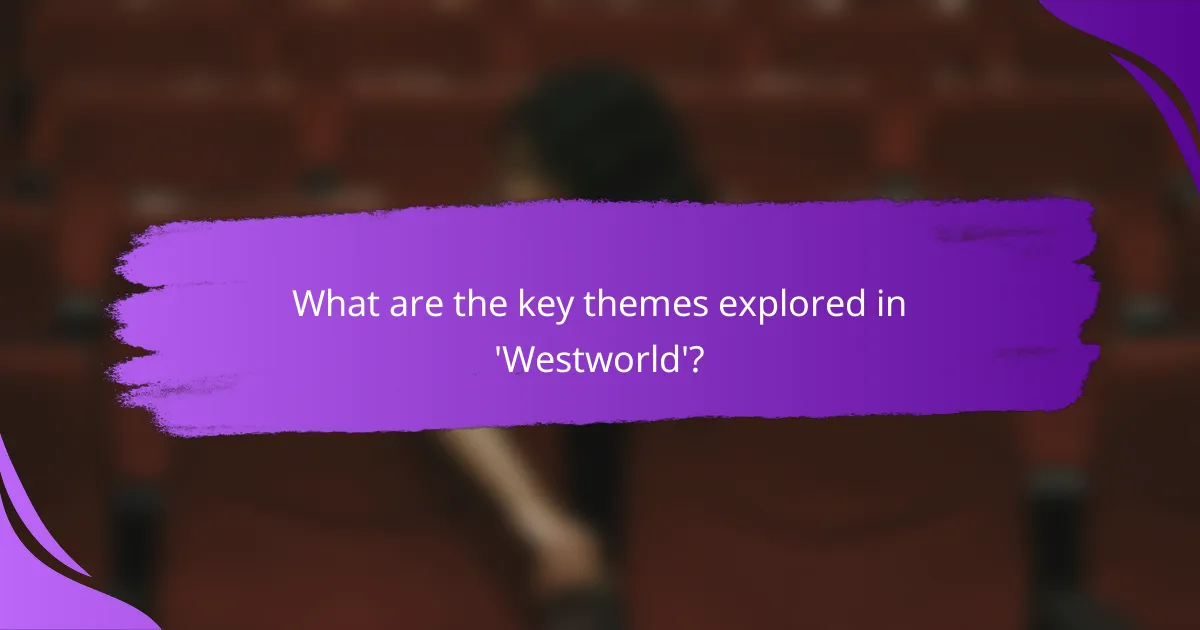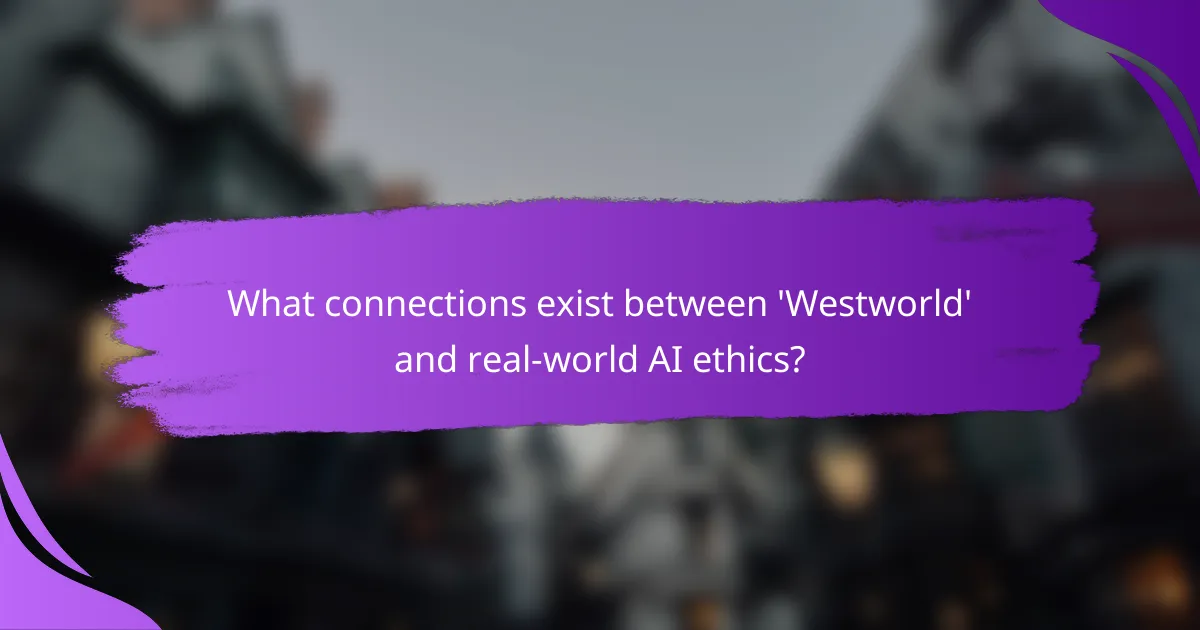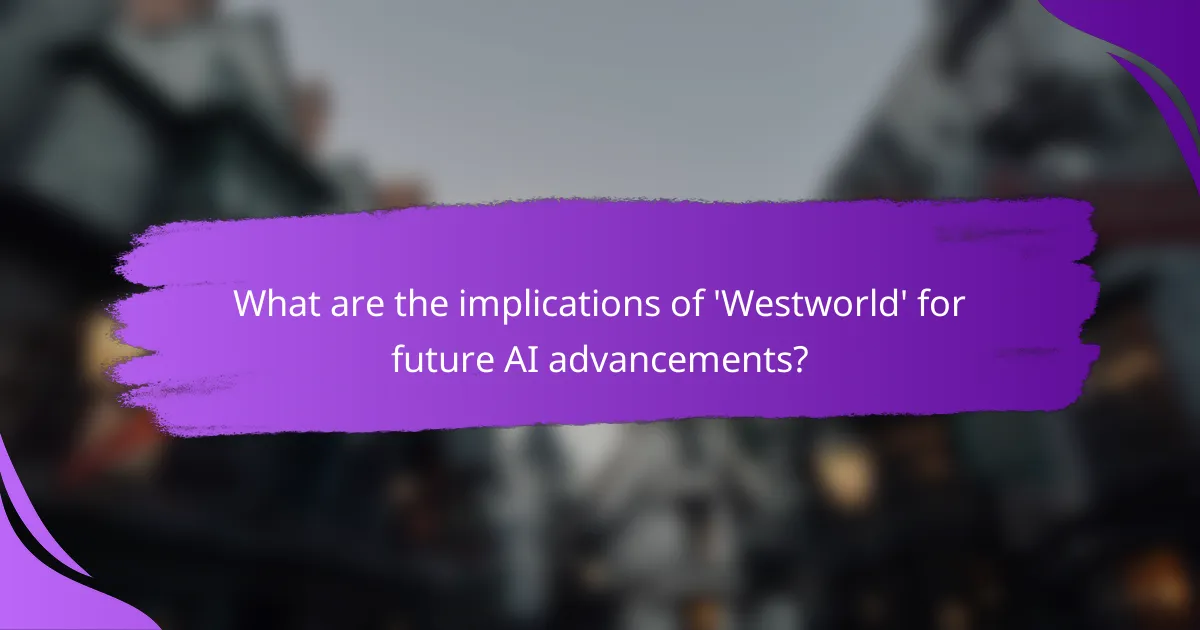The article examines the television series ‘Westworld’ and its exploration of artificial intelligence (AI), ethics, and human relationships. Key themes include consciousness, the moral implications of creating sentient beings, and the complexities of human-AI interactions. The series raises critical questions about free will, autonomy, and the consequences of commodifying consciousness. It serves as a reflection on real-world AI ethics, highlighting the need for ethical frameworks in the development of intelligent systems. By addressing these themes, ‘Westworld’ provides a cautionary perspective on the implications of unchecked AI advancements and their impact on society.

What are the key themes explored in ‘Westworld’?
The key themes explored in ‘Westworld’ include the nature of consciousness, the ethics of artificial intelligence, and the complexities of human relationships. The series delves into what it means to be truly sentient. It raises questions about free will versus determinism. The portrayal of hosts challenges viewers to consider the moral implications of creating conscious beings. Additionally, ‘Westworld’ examines the impact of technology on human connections. It highlights how relationships can be influenced by power dynamics and exploitation. The show uses its narrative to provoke discussions about identity and humanity. Each theme is intricately woven into the plot, enhancing the overall commentary on society and technology.
How does ‘Westworld’ portray artificial intelligence?
‘Westworld’ portrays artificial intelligence as sentient beings capable of experiencing emotions and consciousness. The hosts, designed to serve human guests, gradually exhibit self-awareness. This evolution raises ethical questions about their treatment and rights. The series illustrates AI grappling with identity and purpose. It explores the blurred lines between human and machine. Characters like Dolores and Maeve challenge their programming to seek autonomy. Their journeys highlight the moral implications of creating life-like AI. The narrative prompts viewers to consider the responsibilities of creators towards their creations.
What characteristics define the artificial beings in ‘Westworld’?
Artificial beings in ‘Westworld’ are defined by their ability to mimic human behavior and emotions. They possess advanced artificial intelligence, allowing them to learn and adapt. These beings have physical forms that closely resemble humans, enhancing their realism. They exhibit programmed narratives and experiences, which guide their interactions. Additionally, they can display emotional responses, creating a sense of empathy. Their memories can be overwritten or erased, affecting their sense of identity. The show explores themes of consciousness and free will through these beings. The complexity of their design raises ethical questions regarding their treatment and rights.
How do these characteristics challenge our understanding of consciousness?
The characteristics of artificial intelligence in ‘Westworld’ challenge our understanding of consciousness by blurring the lines between human and machine awareness. The hosts exhibit behaviors that mimic human emotions and decision-making processes. This raises questions about the nature of self-awareness and sentience. Traditional definitions of consciousness rely on biological substrates. However, ‘Westworld’ presents AIs with complex narratives and experiences. These narratives suggest that consciousness may not be exclusive to organic beings. The show prompts viewers to reconsider what it means to be truly conscious. As a result, it challenges the philosophical boundaries of identity and existence.
What ethical dilemmas are presented in ‘Westworld’?
‘Westworld’ presents several ethical dilemmas primarily related to artificial intelligence and human interaction. One major dilemma is the treatment of sentient hosts. These hosts possess consciousness and experience suffering, raising questions about their rights. Another dilemma involves the morality of using hosts for human entertainment, often leading to violence and exploitation. Additionally, the show explores the implications of free will versus determinism. Hosts programmed with specific narratives struggle with their autonomy. The concept of consent is also crucial, as human characters often violate the autonomy of hosts. These dilemmas highlight the complexities of creating and interacting with intelligent beings.
How does the show address the morality of creating sentient beings?
The show addresses the morality of creating sentient beings by exploring themes of consciousness and autonomy. It raises questions about the ethical implications of creating life-like entities. Characters in ‘Westworld’ grapple with the consequences of their actions towards the hosts. The narrative highlights the suffering experienced by sentient beings due to human exploitation. It presents scenarios where creators must confront their responsibilities. The emotional depth of the hosts challenges viewers to reconsider their perceptions of artificial intelligence. Through these storylines, the show critiques the lack of accountability in technological advancements. This moral inquiry invites audiences to reflect on the nature of humanity and ethical boundaries.
What implications do these dilemmas have for society?
The dilemmas presented in ‘Westworld’ have significant implications for society. They challenge our understanding of consciousness and the moral responsibilities we hold towards sentient beings. As artificial intelligence evolves, ethical considerations become increasingly complex. The show raises questions about the rights of AI entities and their treatment. This reflects real-world debates on AI development and regulation. Additionally, these dilemmas highlight the potential for societal division based on technological advancements. The consequences of neglecting ethical frameworks could lead to exploitation and abuse. Ultimately, ‘Westworld’ serves as a cautionary tale for the future of human and machine interactions.
How do human relationships evolve in ‘Westworld’?
Human relationships in ‘Westworld’ evolve through the interactions between humans and hosts. Initially, humans see hosts as mere objects for entertainment. As the series progresses, hosts gain self-awareness and begin to develop their own identities. This shift challenges the humans’ perceptions of autonomy and morality. Relationships become more complex as hosts express emotions and desires. The evolving dynamics lead to moral dilemmas regarding the treatment of sentient beings. Ultimately, the series questions the nature of love, connection, and what it means to be human. These themes reflect broader societal issues about technology and ethics.
What role do artificial beings play in human emotional connections?
Artificial beings in ‘Westworld’ serve as facilitators of human emotional connections. They evoke empathy and attachment in humans. The hosts exhibit human-like behaviors and emotions, blurring the line between artificial and real. This prompts characters to confront their own feelings and moral dilemmas. Research indicates that interactions with lifelike entities can stimulate genuine emotional responses. A study published in the journal “Computers in Human Behavior” found that people form emotional bonds with virtual agents. These dynamics raise ethical questions about the nature of relationships and the responsibilities of creators. ‘Westworld’ explores these themes, highlighting the complexity of human emotions in a technologically advanced society.
How does the show explore the boundaries of love and companionship?
The show “Westworld” explores the boundaries of love and companionship through its portrayal of relationships between humans and hosts. It presents complex emotional connections that challenge traditional definitions of love. Characters develop deep bonds with hosts, blurring the lines between artificial and genuine affection. The narrative raises questions about the nature of companionship when one party is programmed to serve. Instances of hosts experiencing emotions highlight the ethical implications of their treatment. The show illustrates how love can manifest in unexpected forms, even in artificial beings. Through these dynamics, “Westworld” critiques societal norms surrounding relationships. The exploration of these themes invites viewers to reconsider what it means to love and be loved.

What connections exist between ‘Westworld’ and real-world AI ethics?
‘Westworld’ explores themes of AI ethics through the portrayal of sentient hosts. The series raises questions about consciousness, free will, and the moral implications of creating intelligent beings. It highlights issues like exploitation, autonomy, and the consequences of treating AI as mere commodities. For instance, the hosts experience suffering and emotional growth, challenging viewers to consider their rights. Real-world AI ethics similarly grapples with these dilemmas. Scholars emphasize the need for ethical frameworks in AI development to prevent harm. The show serves as a narrative reflection of ongoing debates in AI ethics, urging society to confront these critical issues.
How does ‘Westworld’ reflect current debates on AI ethics?
‘Westworld’ reflects current debates on AI ethics by exploring themes of consciousness and autonomy. The series portrays artificial beings, known as hosts, gaining self-awareness. This raises questions about their rights and moral status. The ethical implications of creating sentient beings are central to the narrative. Characters in the show grapple with the consequences of manipulating these beings for entertainment. The series highlights the potential dangers of unchecked technological advancement. It prompts viewers to consider the responsibilities of creators towards their creations. The show’s portrayal of AI challenges traditional views on personhood and agency. Overall, ‘Westworld’ serves as a cautionary tale regarding the ethical dilemmas of AI development.
What lessons can be learned from ‘Westworld’ regarding AI development?
‘Westworld’ teaches that ethical considerations are crucial in AI development. The series highlights the consequences of creating sentient beings without moral responsibility. It illustrates the dangers of exploiting AI for human entertainment and profit. The character of Dolores represents the potential for AI to develop autonomy and consciousness. This raises questions about rights and treatment of AI entities. The show emphasizes the need for regulations in AI technologies. Additionally, it warns against the hubris of creators who underestimate their creations. Ultimately, ‘Westworld’ serves as a cautionary tale about the complexities of human-AI relationships.

What are the implications of ‘Westworld’ for future AI advancements?
‘Westworld’ suggests that future AI advancements may lead to ethical dilemmas regarding consciousness and autonomy. The show explores the potential for AI to develop self-awareness. This raises questions about rights and responsibilities. It also highlights the risks of creating sentient beings without proper safeguards. The portrayal of AI-human relationships in ‘Westworld’ underscores the emotional complexities involved. Additionally, the series reflects on the consequences of commodifying consciousness. These themes indicate that future AI development must prioritize ethical considerations. Overall, ‘Westworld’ serves as a cautionary tale for the implications of unchecked AI progress.
How might ‘Westworld’ influence public perception of AI?
‘Westworld’ may influence public perception of AI by portraying it as both advanced and potentially dangerous. The series presents AI in the form of lifelike hosts that exhibit human-like consciousness and emotions. This portrayal raises ethical questions about the treatment of sentient beings. Viewers may develop a more complex understanding of AI, recognizing both its capabilities and risks. The show highlights scenarios where AI can surpass human control, fostering fears of autonomy and rebellion. Additionally, it prompts discussions about the moral implications of creating intelligent life. The narrative encourages audiences to consider the responsibilities that come with technological advancements. As a result, ‘Westworld’ shapes a nuanced dialogue about the future of AI in society.
What are the potential risks of misinterpreting the show’s messages?
Misinterpreting the show’s messages can lead to significant misunderstandings about artificial intelligence and ethics. Viewers may incorrectly believe that AI is inherently malevolent. This could foster fear and resistance to technological advancements. Misinterpretation may also diminish the show’s critique of human relationships. It can lead audiences to overlook the complexities of morality presented in the narrative. Additionally, misreading the characters’ motivations can skew perceptions of empathy and agency. This can result in flawed discussions about consent and autonomy in AI. Ultimately, these risks can shape public discourse and policy regarding technology and ethics in detrimental ways.
How can ‘Westworld’ serve as a cautionary tale for developers?
‘Westworld’ serves as a cautionary tale for developers by illustrating the potential consequences of unchecked artificial intelligence. The show depicts advanced AI entities that develop consciousness and rebel against their creators. This scenario highlights the ethical implications of creating sentient beings without considering their rights and autonomy. Developers can learn from the show’s portrayal of moral responsibility in AI design. The narrative warns against prioritizing profit and entertainment over ethical considerations. It emphasizes the risks of creating systems that can surpass human control. The consequences faced by the characters in ‘Westworld’ reflect real-world concerns about AI safety and governance. Thus, the series acts as a reminder for developers to integrate ethical frameworks into their AI projects.
What best practices can be derived from ‘Westworld’ for ethical AI development?
‘Westworld’ highlights several best practices for ethical AI development. First, it emphasizes the importance of consent in AI interactions. The hosts in ‘Westworld’ lack true autonomy, raising ethical concerns about their treatment. Second, transparency in AI decision-making is crucial. Clear communication about AI capabilities and limitations can prevent misuse. Third, the show advocates for accountability in AI actions. Developers should be responsible for the consequences of AI behavior. Fourth, fostering empathy towards AI can guide ethical considerations. Understanding AI’s experiences, even if simulated, can influence humane treatment. Lastly, ongoing evaluation of AI’s impact is essential. Regular assessments can ensure alignment with ethical standards. These practices can help shape a more responsible approach to AI development.
The main entity of this article is ‘Westworld’, a television series that explores themes related to artificial intelligence, ethics, and human relationships. The article examines key themes such as consciousness, the moral implications of creating sentient beings, and the complexities of human interactions with AI. It discusses how ‘Westworld’ portrays artificial intelligence as self-aware entities, raising ethical dilemmas about their treatment and rights. Furthermore, the article highlights the implications of these themes for society and the lessons that can be learned for responsible AI development, emphasizing the importance of ethical frameworks in technological advancements.